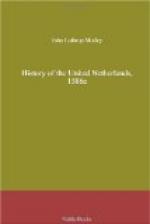The Leicester party, then, proclaimed extreme democratic principles as to the origin of government and the sovereignty of the people. They sought to strengthen and to make almost absolute the executive authority of their chief, on the ground that such was the popular will; and they denounced with great acrimony the insolence of the upstart members of the States, half a dozen traders, hired advocates, churls, tinkers, and the like—as Leicester was fond of designating the men who opposed him—in assuming these airs of sovereignty.
This might, perhaps, be philosophical doctrine, had its supporters not forgotten that there had never been any pretence at an expression of the national will, except through the mouths of the States. The States-General and the States-Provincial, without any usurpation, but as a matter of fact and of great political convenience, had, during fifteen years, exercised the authority which had fallen from Philip’s hands. The people hitherto had acquiesced in their action, and certainly there had not yet been any call for a popular convention, or any other device to ascertain the popular will. It was also difficult to imagine what was the exact entity of this abstraction called the “people” by men who expressed such extreme contempt for “merchants, advocates, town-orators, churls, tinkers, and base mechanic men, born not to command but to obey.” Who were the people when the educated classes and the working classes were thus carefully eliminated? Hardly the simple peasantry—the boors— who tilled the soil. At that day the agricultural labourers less than all others dreamed of popular sovereignty, and more than all others submitted to the mild authority of the States. According to the theory of the Netherland constitutions, they were supposed—and they had themselves not yet discovered the fallacies to which such doctrines could lead—to be represented by the nobles and country-squires who maintained in the States of each Province the general farming interests of the republic. Moreover, the number of agricultural peasants was comparatively small. The lower classes were rather accustomed to plough the sea than the land, and their harvests were reaped from that element, which to Hollanders and Zeelanders was less capricious than the solid earth. Almost every inhabitant of those sea-born territories was, in one sense or another, a mariner; for every highway was a canal; the soil was percolated by rivers and estuaries, pools and meres; the fisheries were the nurseries in which still more daring navigators rapidly learned their trade, and every child took naturally to the ocean as to its legitimate home.




